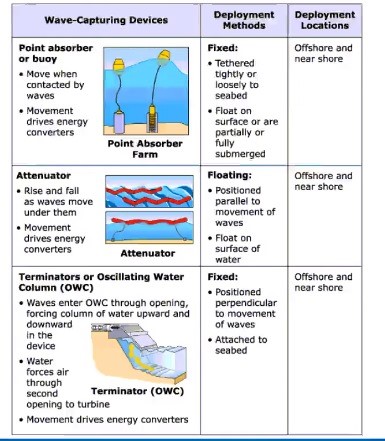Harnessing the power of ocean waves water is currently th - GED Prep
Question
Harnessing the Power of Ocean Waves
- "Water is currently the leading renewable energy source used by electric utilities to generate electric power." Energy Information Administration (EIA)
- A predominant source of hydroelectric power is moving water-the water that runs in rivers, streams, and other waterways. The moving water turns turbines, which can resemble large propellers or fan blades. As a turbine spins, an axle at its center also spins. Machines then use this constant spinning motion to convert the energy of the moving water into electricity. On a larger scale, the world's oceans are also moving-in currents throughout these vast bodies of water, and as waves along hundreds of thousands of miles of coastline. As with land-based waterways, the power of ocean waves could be used to produce electricity. Currently, the technology exists to meet a significant portion of the world's energy demands by converting wave power to electricity.
- Methods for Capturing Wave Power
There are several types of devices used to capture ocean wave power, such as point absorbers, terminators (also called oscillating water columns1), and attenuators (see Table 1). Additionally, there are several methods and locations of deployment for these devices, including fixed and floating, and onshore, near shore, and offshore. Together, the wave-capturing device, the deployment method, and the deployment location determine the amount of energy captured and available for conversion into electricity.
See Table 1 for examples of wave-capturing devices, deployment methods, and deployment locations.

4. Advantages and Disadvantages
As with any technology that converts our world's resources to energy, there are advantages and disadvantages to using ocean wave power. Supporters of the technology point to a critical advantage-ocean wave power does not release heat-trapping gases into the atmosphere. Additionally, if ocean wave power provides a portion of the electricity currently being met by fossil fuel power, then fewer fossil fuels will be burned and, in turn, fewer heat-trapping gases will be released. Thus, ocean wave power can lead to a reduction in heat-trapping gases accumulating in the atmosphere. Proponents of using ocean waves to generate power cite another advantage: the technology does not use or waste water, but merely displaces it.
5. These arguments are countered by opponents of ocean wave power, who contend that disadvantages of using waves to generate electricity are more numerous than the advantages. They argue that the technology is likely to disrupt marine ecosystems and introduce pollutants into marine waters. Specifically, energy collection and conversion devices may disrupt migratory patterns, expose marine animals to risk of entanglement in the equipment, and repel or attract species to such a degree that ecosystems are thrown out of balance. Adversaries of the technology do not limit their argument to the environmental impact of ocean wave technology. Instead, they claim that deploying ocean wave devices could also disrupt the relationships that people have with the oceans by ruining their views of the seaside.
6. Whether one is a proponent or opponent of harnessing the ocean's wave power for our own use, it is clear that there are benefits and pitfalls to the technology. Advocates of ocean wave power argue that cleaner energy production is worth the risk of disrupting marine habitats. But people who challenge the use of ocean wave power counter that any risk to our fragile ecosystems is too much of a risk.
Read this sentence from paragraph 2.
Currently, the technology exists to meet a significant portion of the world's energy demands by converting wave power to electricity.
If the author removed the word "significant" from this sentence, the new sentence would
Answers
-
-
-
-
correct
Explanation
The correct answer is d.
Removing the word "significant" from the sentence would show a diminished potential for this technology. The term "significant" implies that wave power has the capability to make a substantial contribution to meeting global energy demands. Without it, the sentence would lack emphasis on the scale of impact that wave power technology could have, suggesting a lesser degree of potential.
No Payment Cards Needed






